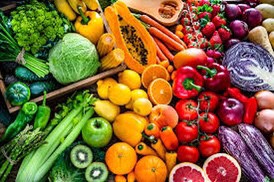The reason why a person gets fever (high blood temperature) when attacked by COVID-19 is mainly because the immune system is fighting the virus. No one knows how long these virus safety measures will need to stay in place, but it presents a perfect time to protect and improve your health while practising social distancing. Nutrition and food security in every way are critical determinants of immune responses. Beyond healthy eating, all other precautions needed to ensure availability and accessibility to food for the family are equally important for food and nutrition security. Maintaining a healthy gut health is the first line of defence since about 70% of our immune system dwells in the digestive tract. Good nutrition is especially important for keeping your immune system in a competent condition. The exact composition of a diversified, balanced and nutritionally adequate diet will vary depending on individual characteristics of age, gender, lifestyle and degree of physical activity, cultural context, locally accessible foods and other dietary customs. However, the principles of what constitutes a healthy diet remain the same. Here are 3 important guidelines to follow to help with family nutrition in this period of COVID-19 pandemic.
- Nutrition to strengthen the immune system
Plan your meals to include foods that contain high levels of antioxidants and vitamins as well as decrease inflammation to keep you healthy and strong. Fruits such as oranges, tangerines, lemons and grapefruits are high in Vitamin C, which is thought to increase the production of white blood cells, which are key to fighting infections. Red bell peppers, kontomire, broccoli, garlic, ginger, spinach, turmeric, pawpaw, watermelon among many others contain a diversity of vitamins and minerals that boost the immune system.

Note that variety is key to proper nutrition; also pay attention to serving sizes, and recommended daily intake so that you do not get too much of a particular nutrition and too little of others.
2. Reduce trips to the markets and do not hoard food during the pandemic
Every single reduction in the number of contacts you have per day with people will have a significant impact on the ability of the virus to spread in a population. This will also mean to minimize the frequency of visits to the market to purchase food. Before you go to the market, plan for at least one week. This will require you make a shopping list. Factors to consider for family nutrition may include what you will like to serve for breakfast, lunch and dinner, foods your family likes, cooking and preparation methods, time available especially now that people are working from home. If you have children at home, be sure to include them in the meal planning and preparation while them reading/writing, maths and science as it applies to nutrition. For instance counting numbers of ingredients and measuring fluids and cook time.

Stock up on nutrition but that should not be an excuse to hoard food. Only buy as much as your family will need for a period. You also have to consider the available storage facility. Do not buy more than you can store effectively. When food is left to go bad in households in times like these, it has a ripple effect to pose a threat to food security everywhere.
3. Living with an existing Non-Communicable Disease (NCD)
If you have a non-communicable disease, you are at increased risk of severe illness from corona virus. It is a critical time to take your dietary recommendations by your dietician seriously and according to current guidance, you should be strict in following social distance measures, including significant limitation of personal interactions with family and friends. Taking necessary precautions, families should look after their loved ones who have pre-existing medical conditions, as they are more vulnerable to the coronavirus.

Generally, foods recommended include foods high in dietary fibre. Vegetable components of meals should be very high in the forms of salads, stews and soups. Reduce intake of refined carbohydrates and eliminate the use of artificial spices from meals. Make a conscious effort to limit salt intake by choosing products that are low in sodium content, limiting consumption of salty snacks like plantain chips and restraining yourself from having salt or high sodium sauces on the dining table. Increase intake of potassium by consuming fresh fruits and vegetables. Potassium has the ability to mitigate the bad effects of elevated sodium consumption.

Practice the above while maintaining following all the safety measures outlined by the Ghana Health Service, especially hand washing with soap and maintaining clean hands with alcohol based sanitizers. Get to understand that these times can be extremely stressful and so an appreciable level of stress control is very needful. Lastly, stay hydrated.

